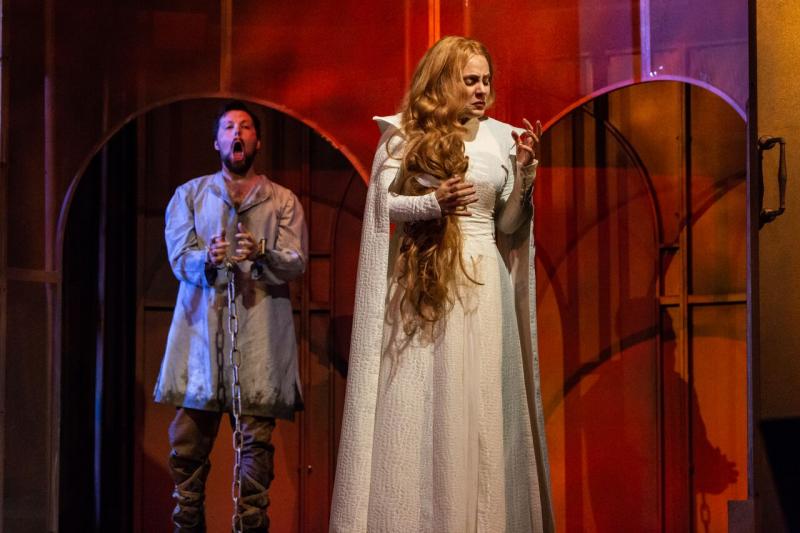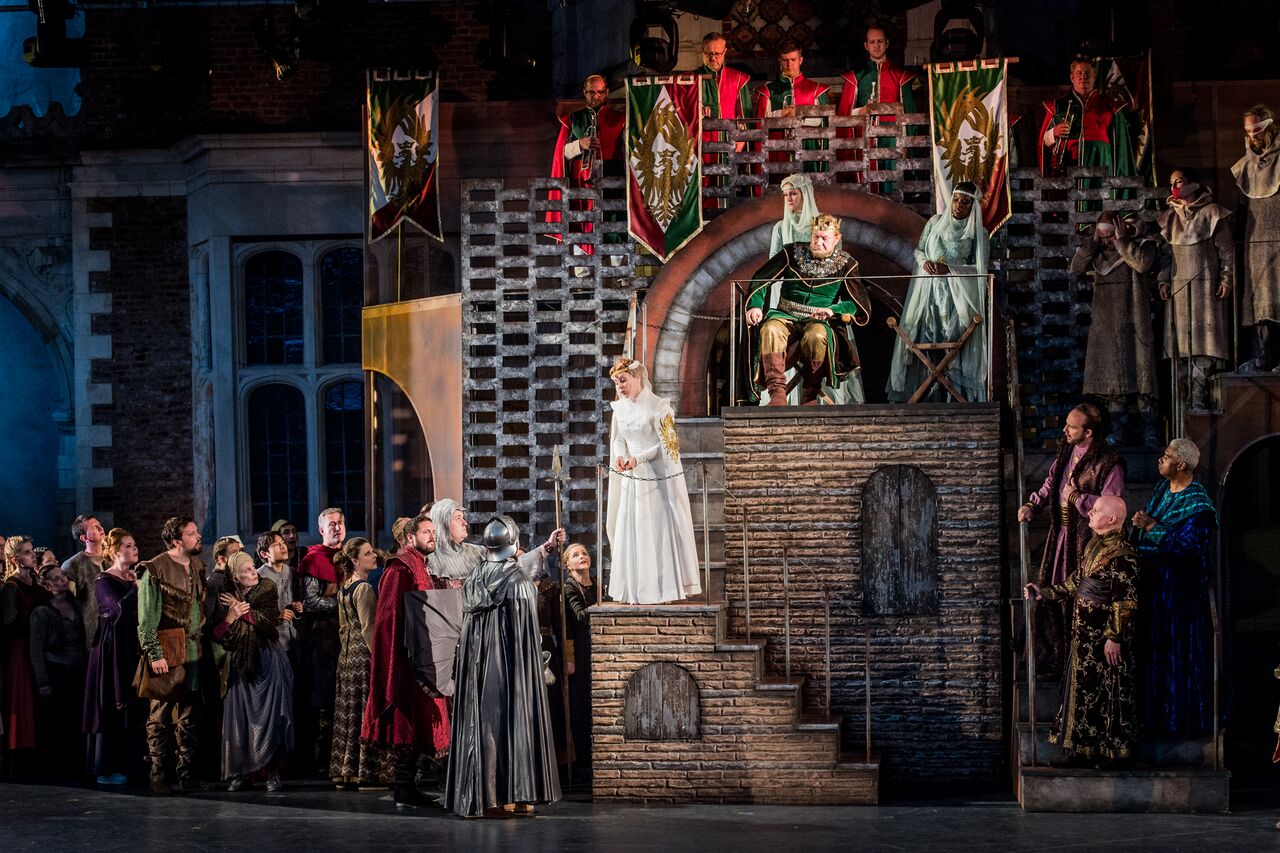Isabeau, Opera Holland Park review - Mascagni's lumpy Godiva-ride rarity | reviews, news & interviews
Isabeau, Opera Holland Park review - Mascagni's lumpy Godiva-ride rarity
Isabeau, Opera Holland Park review - Mascagni's lumpy Godiva-ride rarity
Fine singing and playing can't quite sell a hoary slice of awkward medievalism

Valiant Opera Holland Park, always taking up the gauntlet for Italian operas which should mostly never be staged again. Worst was Zandonai's Francesca da Rimini, where musical ambition vastly outruns technique and inspiration. Mascagni's Iris with its hideous misogyny has now been followed by the same composer's Isabeau of 1911, turgid of libretto and dramaturgy.
This starts more promisingly, with six onstage trumpeters in livery – albeit two in specs - backing up the announcement of a joust for the hand of fair Isabeau, King Raimondo’s daughter, newly emerged from chaste retreat. Her entry, albeit not on the required white horse, and later her ride through the streets on a puppet-y one, naked in Godiva fashion at the behest of her angry father, both have radiant and interestingly scored music, even if the latter is very sub-Strauss (Mascagni must have been aware of Der Rosenkavalier, another, earlier premiere of 1911). Young Italian conductor Francesco Cilluffo gets especially lovely phrasing from lower strings, but has some trouble co-ordinating a wide spread of players (the percussionists, way to his right, aren’t always in synch). The results are good enough to suggest that a worthwhile orchestral suite could be made from some of the opera’s music.
Yet oh, how it begins to drag when we switch to rural falconer Folco and his granny, come to court to beg a position for the young man; not even the ringing tones of the UK’s most Italianate tenor hope, David Butt Philip, can shine out fully given the limping pace and turgid text (by Illica, astonishingly, librettist of so many great Puccini dramas – what a good influence his co-writer Giacosa must have been).  There’s a rather striking pre-tournament chorus, sounding oddly like something out of Tippett’s The Midsummer Marriage, premiered over 40 years later, and brilliantly sung (if over-acted in some cases - ditch the idiot) by OHP’s young and golden chorus. The shifting bits of scenery actually come together quite effectively for a pageant-tableau (pictured above). The outcome, you think, could be positive: Isabeau only accepts one of the five suitors, the (to us) hilariously-named Ethel, rival to "Odoardo di Edimborgo" and others, out of pity, not love. But then it all goes pear-shaped for the iconic virgin: this is when dad (stentorian Mikhail Svetlov) orders the Godiva ride.
There’s a rather striking pre-tournament chorus, sounding oddly like something out of Tippett’s The Midsummer Marriage, premiered over 40 years later, and brilliantly sung (if over-acted in some cases - ditch the idiot) by OHP’s young and golden chorus. The shifting bits of scenery actually come together quite effectively for a pageant-tableau (pictured above). The outcome, you think, could be positive: Isabeau only accepts one of the five suitors, the (to us) hilariously-named Ethel, rival to "Odoardo di Edimborgo" and others, out of pity, not love. But then it all goes pear-shaped for the iconic virgin: this is when dad (stentorian Mikhail Svetlov) orders the Godiva ride.
It doesn’t make much sense for the choral men to be brutalising their women after the interval when they agree to shut their windows to the sight of their naked lady and to punish anyone who looks on her with death. The one who happens to see her is the unfortunate Folco. Cue an inept end of scene and a final love-too-late semi-duet where Anne Sophie Duprels, always a strong presence on stage, warms up from her initial under-the-note delivery to match Philip for Italianate singing of great lustre. That’s ruined by another silly conclusion, for which Lloyd-Evans must be blamed as much as Mascagni and Illica. Well, it’s not a bore, if you must tick off these obscurities, but it is the sort of thing that gives opera a bad name, and the big question, to both Mascagni and OHP, has to be – why?
Add comment
The future of Arts Journalism
You can stop theartsdesk.com closing!
We urgently need financing to survive. Our fundraising drive has thus far raised £49,000 but we need to reach £100,000 or we will be forced to close. Please contribute here: https://gofund.me/c3f6033d
And if you can forward this information to anyone who might assist, we’d be grateful.

Subscribe to theartsdesk.com
Thank you for continuing to read our work on theartsdesk.com. For unlimited access to every article in its entirety, including our archive of more than 15,000 pieces, we're asking for £5 per month or £40 per year. We feel it's a very good deal, and hope you do too.
To take a subscription now simply click here.
And if you're looking for that extra gift for a friend or family member, why not treat them to a theartsdesk.com gift subscription?
more Opera
 Tosca, Royal Opera review - Ailyn Pérez steps in as the most vivid of divas
Jakub Hrůša’s multicoloured Puccini last night found a soprano to match
Tosca, Royal Opera review - Ailyn Pérez steps in as the most vivid of divas
Jakub Hrůša’s multicoloured Puccini last night found a soprano to match
 Tosca, Welsh National Opera review - a great company reduced to brilliance
The old warhorse made special by the basics
Tosca, Welsh National Opera review - a great company reduced to brilliance
The old warhorse made special by the basics
 BBC Proms: The Marriage of Figaro, Glyndebourne Festival review - merriment and menace
Strong Proms transfer for a robust and affecting show
BBC Proms: The Marriage of Figaro, Glyndebourne Festival review - merriment and menace
Strong Proms transfer for a robust and affecting show
 BBC Proms: Suor Angelica, LSO, Pappano review - earthly passion, heavenly grief
A Sister to remember blesses Puccini's convent tragedy
BBC Proms: Suor Angelica, LSO, Pappano review - earthly passion, heavenly grief
A Sister to remember blesses Puccini's convent tragedy
 Orpheus and Eurydice, Opera Queensland/SCO, Edinburgh International Festival 2025 review - dazzling, but distracting
Eye-popping acrobatics don’t always assist in Gluck’s quest for operatic truth
Orpheus and Eurydice, Opera Queensland/SCO, Edinburgh International Festival 2025 review - dazzling, but distracting
Eye-popping acrobatics don’t always assist in Gluck’s quest for operatic truth
 MARS, Irish National Opera review - silly space oddity with fun stretches
Cast, orchestra and production give Jennifer Walshe’s bold collage their all
MARS, Irish National Opera review - silly space oddity with fun stretches
Cast, orchestra and production give Jennifer Walshe’s bold collage their all
 Káťa Kabanová, Glyndebourne review - emotional concentration in a salle modulable
Janáček superbly done through or in spite of the symbolism
Káťa Kabanová, Glyndebourne review - emotional concentration in a salle modulable
Janáček superbly done through or in spite of the symbolism
 Buxton International Festival 2025 review - a lavish offering of smaller-scale work
Allison Cook stands out in a fascinating integrated double bill of Bernstein and Poulenc
Buxton International Festival 2025 review - a lavish offering of smaller-scale work
Allison Cook stands out in a fascinating integrated double bill of Bernstein and Poulenc
 Tosca, Clonter Opera review - beauty and integrity in miniature
Happy surprises and a convincing interpretation of Puccini for today
Tosca, Clonter Opera review - beauty and integrity in miniature
Happy surprises and a convincing interpretation of Puccini for today
 Hamlet, Buxton International Festival review - how to re-imagine re-imagined Shakespeare
Music comes first in very 19th century, very Romantic, very French operatic creation
Hamlet, Buxton International Festival review - how to re-imagine re-imagined Shakespeare
Music comes first in very 19th century, very Romantic, very French operatic creation
 Falstaff, Glyndebourne review - knockabout and nostalgia in postwar Windsor
A fat knight to remember, and snappy stagecraft, overcome some tedious waits
Falstaff, Glyndebourne review - knockabout and nostalgia in postwar Windsor
A fat knight to remember, and snappy stagecraft, overcome some tedious waits
 Salome, LSO, Pappano, Barbican review - a partnership in a million
Asmik Grigorian is vocal perfection in league with a great conductor and orchestra
Salome, LSO, Pappano, Barbican review - a partnership in a million
Asmik Grigorian is vocal perfection in league with a great conductor and orchestra

Comments
This is the sort of snobbish